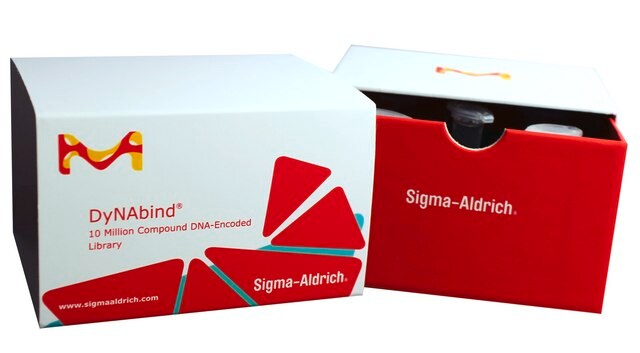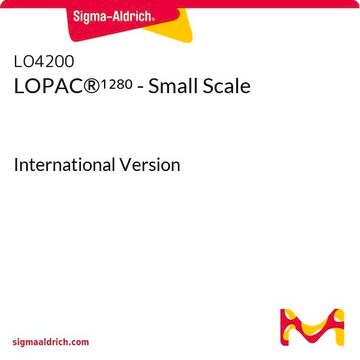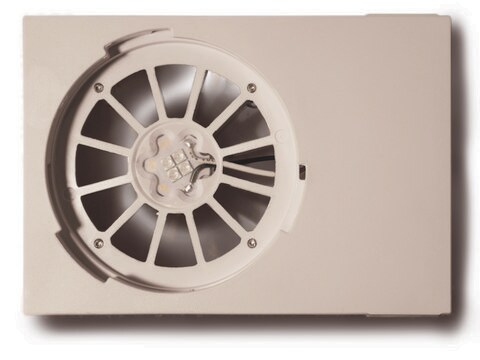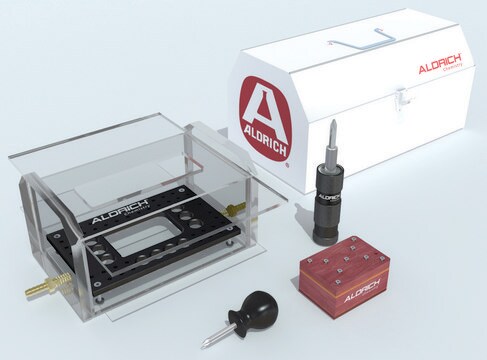추천 제품
형태
pellets
저장 온도
−20°C
애플리케이션
DNA-encoded library (DEL) technology is a drug discovery tool containing small DNA-barcoded compounds (Satz 2018). The DyNAbind fragment DEL contains small molecular weight compounds. The high ligand efficiency of fragment molecules is harnessed to effectively probe a target′s binding site and increase the likelihood of discovering binders (Murray and Rees 2009, Murray et al. 2012). Moreover, this library uses DyNAbind′s proprietary Dynamic Library technology to drive binder optimization and reveal not only individual fragments, but also joined fragment pairs for over 370,000 highly diverse structures (Reddavide et al. 2015, Reddavide et al. 2019). DyNAbind′s proprietary Dynamic Library technology reshuffles fragment pairs to automatically optimize the affinity of binders and increase the chances of finding good hits. After a pooled screening approach, bound fragments can be determined using next-generation sequencing of the barcodes. Analysis of the sequencing data is provided at no additional cost through a portal on our website which will generate a list of the fragments that bind the target. These fragments can be used as structural starting points to develop larger, more drug-like compounds.
Analysis Portal
More information about DyNAbind
Analysis Portal
More information about DyNAbind
특징 및 장점
Product Features and Benefits:
Product Overview:
- Off-the-shelf, affordable access to DEL technology
- Dynamic fragment library provides a revolutionary approach to DELs offering unprecedented library and data quality
- High level quality control with every single member individually purified and validated to maximize data reliability and chances for finding good hits
- Rule of Three used in library design ensures compounds are in favorable fragment space with good ligand efficiency and plenty of room for optimization (Congreve et al. 2003, Jhoti et al. 2013)
- Ability to perform and validate initial DEL screening internally before engaging service provider
- A library with maximized diversity, ready to deploy against nearly any druggable target
Product Overview:
- Dynamic fragment-based DEL as alternative or complement to existing screening technologies
- Consumable, off-the-shelf product for immediate use
- 5 vials, each containing a single-use library for one experimental condition
- Detailed protocol accessible to most drug discovery labs
- A dedicated analysis portal and protocol to identify hits
법적 정보
Product of DyNAbind GmbH
The use of this DyNAbind Product (the “Product”) is covered by European Patents EP 3 094 745 B1 and EP 3 169 832 B1 and corresponding applications pending in the US, Canada, and Japan. Purchaser is granted the right to use the Product for its internal research use only. This limited use label license does not grant the purchaser any right to use resulting fragments or products in commercial products or services. For information on commercial rights, please contact the outlicensing department at licensing@dynabind.com.
The use of this DyNAbind Product (the “Product”) is covered by European Patents EP 3 094 745 B1 and EP 3 169 832 B1 and corresponding applications pending in the US, Canada, and Japan. Purchaser is granted the right to use the Product for its internal research use only. This limited use label license does not grant the purchaser any right to use resulting fragments or products in commercial products or services. For information on commercial rights, please contact the outlicensing department at licensing@dynabind.com.
DyNAbind is a registered trademark of DyNAbind GmbH
Storage Class Code
13 - Non Combustible Solids
WGK
WGK 3
Flash Point (°F)
Not applicable
Flash Point (°C)
Not applicable
가장 최신 버전 중 하나를 선택하세요:
이미 열람한 고객
Alexander L Satz
ACS medicinal chemistry letters, 9(5), 408-410 (2018-05-26)
Use of DNA-encoded libraries (DELs) in the pharmaceutical industry has rapidly increased. We discuss what to expect when you run a DEL screen and contemplate guidelines for library design. Additionally, we consider some visionary work and extrapolate to the future.
Christopher W Murray et al.
Nature chemistry, 1(3), 187-192 (2009-06-01)
The search for new drugs is plagued by high attrition rates at all stages in research and development. Chemists have an opportunity to tackle this problem because attrition can be traced back, in part, to the quality of the chemical
The 'rule of three' for fragment-based drug discovery: where are we now?
Harren Jhoti et al.
Nature reviews. Drug discovery, 12(8), 644-645 (2013-07-13)
Francesco V Reddavide et al.
Angewandte Chemie (International ed. in English), 54(27), 7924-7928 (2015-05-28)
Dynamic combinatorial chemistry (DCC) explores the thermodynamic equilibrium of reversible reactions. Its application in the discovery of protein binders is largely limited by difficulties in the analysis of complex reaction mixtures. DNA-encoded chemical library (DECL) technology allows the selection of
A 'rule of three' for fragment-based lead discovery?
Miles Congreve et al.
Drug discovery today, 8(19), 876-877 (2003-10-14)
문서
DNA encoded libraries (DELs) offer a paradigm shift in drug discovery by leveraging molecular biology and high-throughput screening. DELs offer a full high-throughput screening library in one vial. Along with our DEL data package, machine learning and AI can be utilized to determine even more information on targets.
Dynamic Library technology in drug discovery delivers reliable results with high chemical diversity, suitable for various targets.
자사의 과학자팀은 생명 과학, 재료 과학, 화학 합성, 크로마토그래피, 분석 및 기타 많은 영역을 포함한 모든 과학 분야에 경험이 있습니다..
고객지원팀으로 연락바랍니다.












